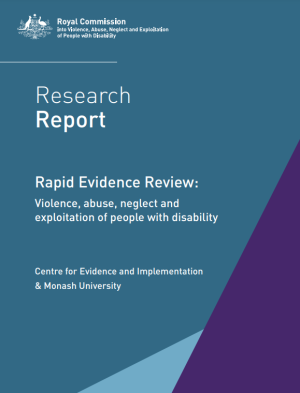Related
-
 Publication 24 Aug 2021
Publication 24 Aug 2021Rapid evidence review: Disability Royal Commission

A new report from researchers Monash University, Western Sydney University and CEI recommends that national policy and more intensive family support services be put in place to help drive down the number of children with disability in child protection who enter the criminal justice system.
Developed for the Royal Commission into Violence, Abuse, Neglect and Exploitation of People with Disability, it is the largest ever study focused on young people living in Australia under the age of 18 with overlapping experiences of child protection involvement, disability and criminalisation.
“Our team of researchers, led by Dr Susan Baidawi at Monash, was tasked with improving understanding of the pathways that lead children with disability from their contact with the child protection system to the criminal justice system,” explains CEI’s Dr Gayatri Kembhavi-Tam.
“We were asked to identify risk and protective factors, to examine the effectiveness of current policy, to identify useful interventions, programs or models and look at barriers to implementation, and to focus on the experiences and needs of Aboriginal and Torres Strait Islander and culturally and linguistically diverse children.”
Broadly, the team found that drug and alcohol use, familial pro-criminal attitudes, loss of connection to birth family, severe mental health issues and trauma-related behaviours were all factors associated with increased chance of criminalisation.
Conversely, factors decreasing the chances of a young person with disability in child protection becoming criminalised included:
“A key input to the study findings were surveys and consultations with a total of 92 professionals at the coalface – including carers, advocates, legal practitioners and people with experience working in out-of-home care, family support services and disability services,” says Gayatri.
“It was generally agreed that neurodisability, mental health conditions and complex trauma were the most common disabilities seen among children in child protection systems who experience criminalisation.”
The report makes seven evidence-informed recommendations for government action:
“Importantly, we noted that improving policy and practice will likely require greater consistency across jurisdictions, equal attention to mental health and trauma-related presentations as to other disabilities, consistent attention to culturally diverse needs, and priority access to support services for these children and their families,” Gayatri comments.
“Addressing disadvantage for children with multiple overlapping needs in these systems is vital to dealing with the ongoing inequalities, neglect and abuse experienced by Australians with disability more generally.”
The Research Report “Care criminalisation of children with disability in child protection systems” was co-authored by Dr Susan Baidawi, Rubini Ball, Lena Turnbull, Emeritus Professor Rosemary Sheehan and Jade Purtell at Monash University; Dr Scott Avery and Robyn Newitt at University of Western Sydney; and CEI’s Dr Gayatri Kembhavi-Tam.
